In this article
HSC Physics Band 6 Study Tips from a Sydney Boys High School Graduate
2019 Sydney Boys High School graduate Raghav achieved Band 6 in HSC Physics. Read the study tips ranging from the process, the resources, and dos and don'ts that helped him achieve his HSC goals.
2019 Sydney Boys High School graduate Raghav Ramanathan achieved a Band 6 in HSC Physics. He shares the study tips that helped him achieve his HSC goals.
In this article, Raghav reveals:
- Why I chose to study Physics
- The process that helped me achieve Band 6 in Physics
- The resources that helped me get a Band 6 in Physics
- In hindsight: Stop, do, and more
- My Band 6 Physics study tips
- My advice to future Year 11 and 12 Physics students
A little bit about myself
Name: Raghav Ramanathan
School: Sydney Boys High School
Year of Graduation: 2019
HSC Courses and Results
| Course | Exam Mark | Assessment Mark | HSC Mark |
| English Advanced (/100) | 93 | 88 | 91 |
| English Extension 1 (/50) | 47 | 45 | 46 |
| Maths Advanced (/100) | 97 | 98 | 98 |
| Maths Extension 1 (/50) | 47 | 47 | 47 |
| Physics (/100) | 91 | 92 | 92 |
| Economics (/100) | 94 | 95 | 95 |
1. Why I chose to study HSC Physics
Physics was marketed to me as a subject that taught students how everyday machines (such as light bulbs) worked. This was particularly appealing to me, and the major decision as to why I chose to study Physics in Year 11 and 12.
If I was to repeat the HSC, I would choose physics again without a doubt.
What I liked about the HSC Physics course
I enjoyed studying Physics as I was able to learn about complex objects that were used on an everyday basis. This ranged from learning about circuits in the Preliminary course to electromagnetic braking in the HSC course.
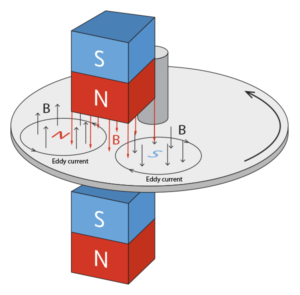
I liked how this allowed me to develop a greater understanding as to how significant Physics developments have impacted the world around us.
Whilst it was my most challenging HSC subject, I found it the most enjoyable.
I also enjoyed the quantitative aspect of the Physics course, as I could check my answers using multiple methods and confirm them to be correct during exams. It gave me confidence in moving forward.
What I disliked about the HSC Physics course
I can definitively say that I disliked the theory aspect of the Physics course the most – specifically how I would have to go over content 3 times or more in order to fully grasp it. This became particularly challenging during module 7 and 8, where most of the content was theory related. This was further exacerbated by my choice to do Economics for the HSC, which involved copious amounts of rote-learning.
2. The process that helped me achieve Band 6 in Physics
Below is a step by step summary of my Physics study plan or study tips.
Step 1: Writing detailed, condensed notes to gain a greater conceptual understanding
Every Sunday, I committed to writing notes for two hours. It allowed me to collate all the information I was struggling with, and the content I believed would most likely be examined (based on feedback from Matrix) into a single document that I could quickly and easily review before my exams.
I ensured I had covered all the content necessary by cross-checking these notes with the theory in my school textbooks, and relevant youtube videos. Handwriting notes helped me understand, recall the content easier, and develop a greater conceptual understanding of the Physics course.
An image of my detailed notes, including the use of diagrams, for Projectile Motion (Module 5) are included below.
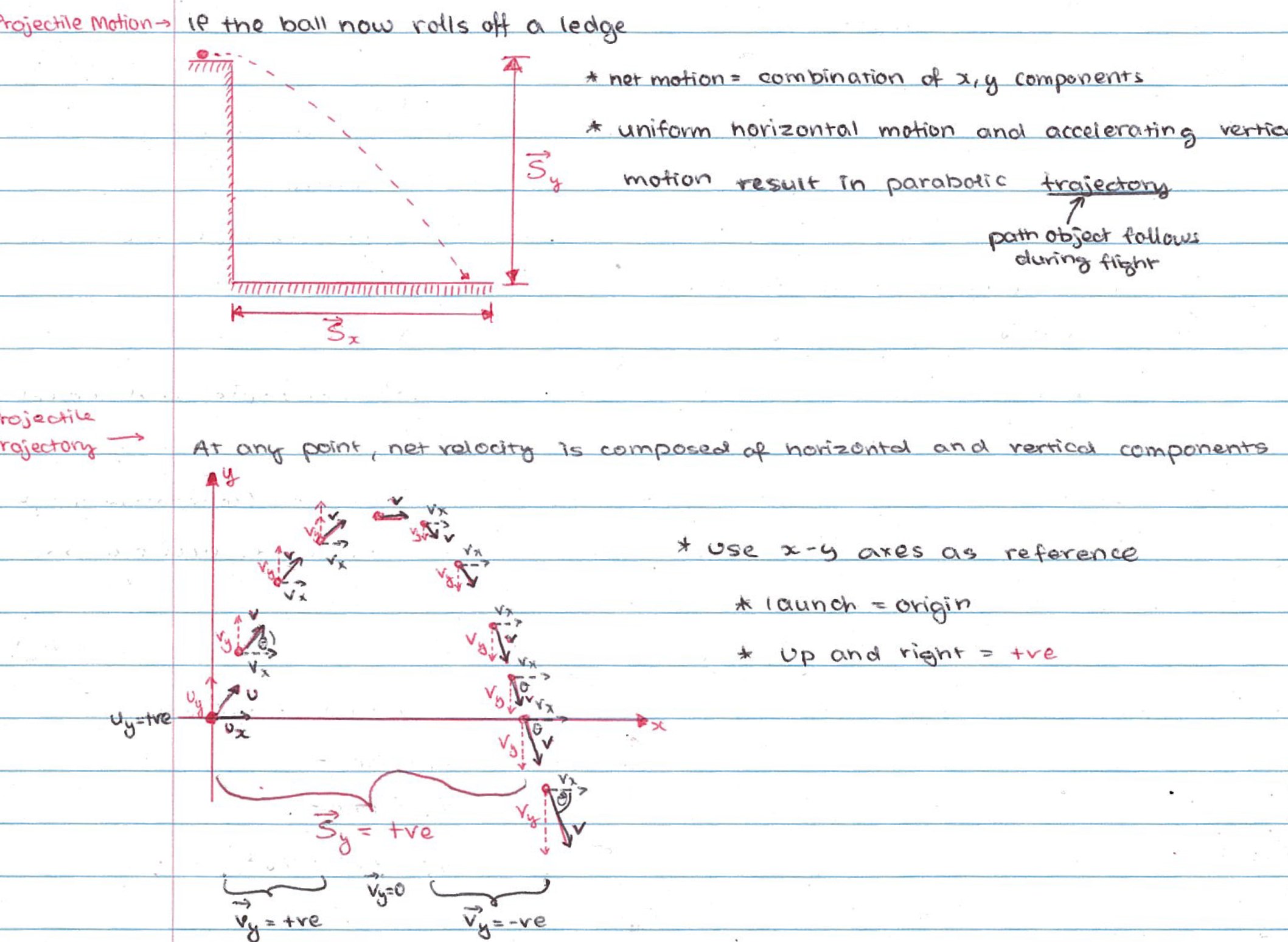
Step 2: Revising regularly to identify my knowledge gaps.
The next step in my process was to consistently revise. I found the revision key to my success as it allowed me to easily identify concepts that I found hard to understand or easy to forget.
During the HSC, I revised the Physics course in two-step process outlined below:
- Re-read my notes on the course once or twice.
- Apply them in practice questions.
This was an efficient use of my time, as it forced me to apply specific physics concepts to a range question types.
The two-step revision process helped me identify any of my weaknesses and areas of improvement.
To revise, I utilised questions from my school textbook and Learnable. Whilst my school textbook had a wide range of questions that reinforced content from the syllabus, the answers were often wrong, making it harder to gauge whether or not I was on the right track.
In comparison, the quizzes on Learnable are detailed and contain more variety. They also show you how you compare to the rest of your cohort. This was an additional motivator for me to improve my results, and revise more regularly.
An image of my Learnable Quiz Dashboard is below.
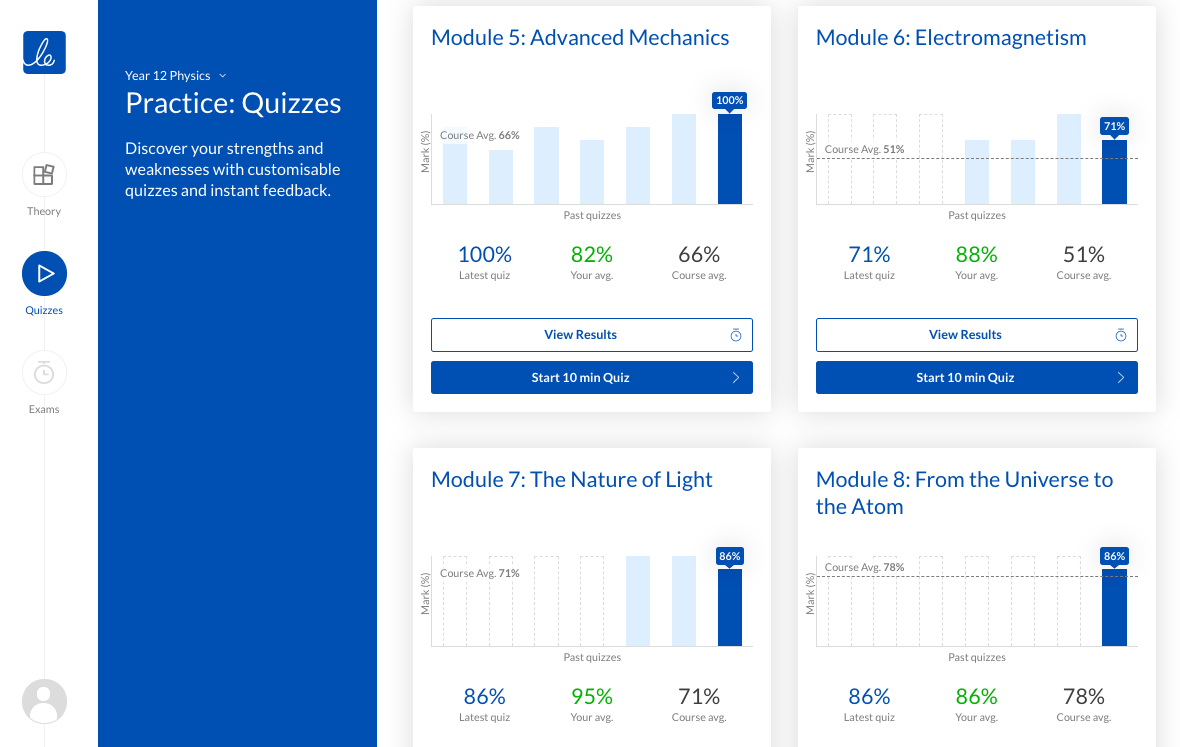
Step 3: Practicing with past papers!
My third step in my studying process was to complete past papers! This tied together with the first and second steps of my study plan efficiently, as it tested my knowledge and understanding of the entire syllabus under timed conditions. Past papers were integral in identifying areas where I either lacked confidence or conceptual understanding before my exams. This then helped me target the areas of the course that I had the most trouble in.
I added any mistakes to my ‘mistake book’ which were then retargeted and relearnt.
To ensure I learned the content, I would then answer a set of questions (step 2) targeted at this problem area before completing another past paper, and the improvement was visible!
Leading up to the HSC exam, I utilised other schools 2019 Trial exams. Any past papers written prior to 2019, I had to filter out questions that were not based on the new syllabus. In addition to the 2019 HSC Paper, below is a list of the papers I strongly recommend. The benefits are huge in exam preparation!
| Paper | Benefits |
| CSSA Trial | The CSSA Trial is a good starting point, as the majority of questions are straightforward, yet they cover the whole syllabus. This will allow you to test your initial knowledge on the entire physics course, providing you with an analysis on the dot points of the syllabus you need to concentrate on. |
| Independent Trial | The Independent Trial, PEM Trial and NEAP Trial are similar in their question variety and question difficulty. If you completed an easier past paper (such as the CSSA Trial) before completing these papers and revised the dot points you had trouble with, these papers will allow you to see if you are HSC exam ready. The questions in these papers mirror the difficulty of the HSC exam and are resultantly invaluable in indicating whether or not you need to revise the syllabus more or complete harder past papers. |
| PEM Trial | |
| NEAP Trial | |
| James Ruse Trial | These three high-ranking schools have significantly harder papers that will push your knowledge and test your ability to answer curveball HSC questions. I recommend doing these only after consolidating your knowledge and ensuring you are comfortable in all areas of the syllabus. These papers are most commonly known for their challenging multiple-choice questions (where the average is around 12/20). Completing these papers will significantly improve your confidence going into the HSC exam. |
| Sydney Boys High Trial | |
| Sydney Grammar Trial |
Step 4: Challenging myself within my friendship group
Finally, 2 or 3 weeks before both our trial and HSC exams, my friends and I would voice call each other twice a week, and go to the library together once a week. We aimed to make this process as easy as possible by using the Free Voice Chat service “Discord” and finding a library that was easily accessible by all of us. This gave us the perfect opportunity to test ourselves on areas of the syllabus we all agreed were difficult to understand.
I found this method of study invaluable for extended response questions.
Talking about Physics questions with my friends was helpful, particularly as some of my friends were weaker in the areas of the course I believed I was stronger in. I was able to explain the concepts to my friends verbally, providing me with an opportunity to convey my knowledge in a concise and clear manner, just like answering an exam question.
Additionally, by having certain concepts explained to me in a similar manner, I was able to understand them much easier. As my friends had also struggled to understand the course at first, I found that they were able to easily relate to the difficulties I was having. This meant, they were able to convey certain concepts r.
3. The resources that helped me get a Band 6 in Physics
The Physics resources I used during Year 11 and 12 are listed below:
- Matrix Theory Book and Workbook
- Jacaranda and Pearson Textbook
- Learnable
- HSC Trial exam papers from other schools
The resources I found the most helpful
I found Learnable to be the most useful resource.
One factor that made it my go-to resource during the HSC was its ease of use.
This invaluable factor is derived from Learnable’s online interface. Rather than having to carry around a 5kg textbook everywhere I went, I was able to cover my content gaps on public transport, or during school study periods, as Learnable was an interactive application that could be used on both my phone and my laptop.
I found Learnable and the Matrix Textbook were designed specifically for the new Physics syllabus. Both resources have detailed yet concise content that covers all areas of the syllabus. This meant that I would still have a thorough knowledge of the course content when using Learnable over a standardised textbook.
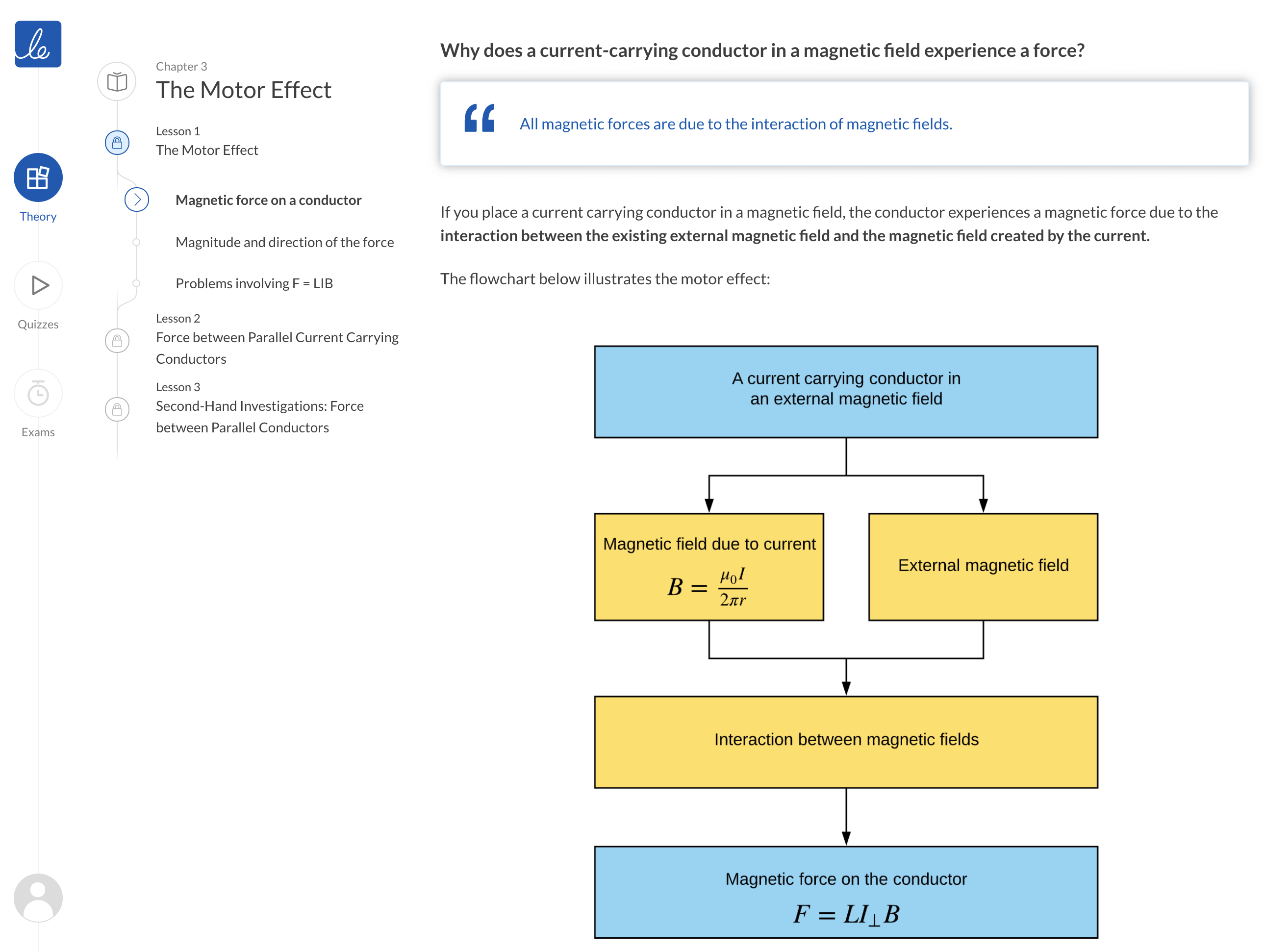
The user interface of Learnable is also designed to assist students in to learn more easily. Compared to textbooks, where information is often collated into large paragraphs, Learnable segregates definitions, formulas and explanations making the information easier to absorb and find.
The resource I found the least helpful
I found my school textbook the least useful resource.
My school textbook contained a lot of extra information that was not relevant to the HSC course.
The practice questions in the textbook also didn’t have any answers, which made it difficult to assess the accuracy of my responses. The physical copy was also too heavy to carry around with me, and the online version of the textbook was often slow and frustrating.
The resource(s) I would recommend for studying HSC Physics
Leading up to my HSC exam, I used Learnable exclusively for studying and reviewing the Physics course. I found it was an extremely efficient method of studying, due to its effective integration of both content and challenging questions. Allowing me to complete steps 1 and 2 of my study plan with ease.
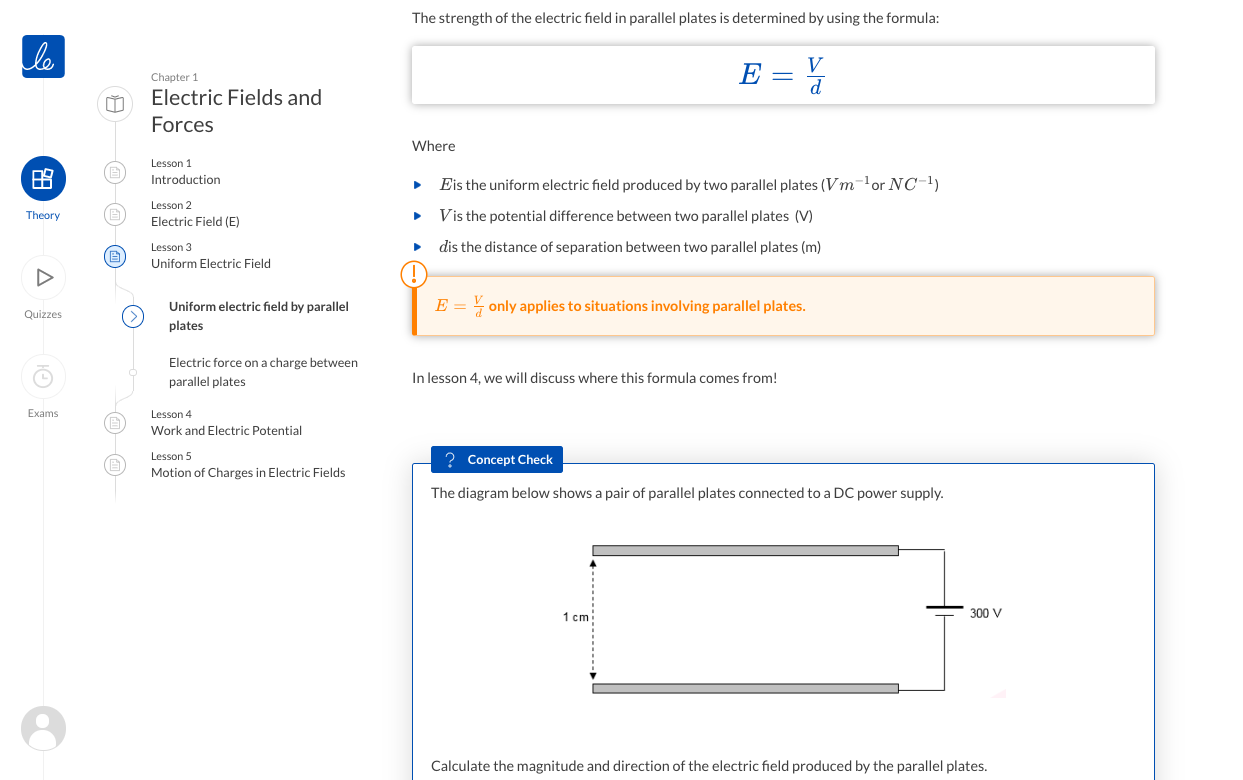
However, Learnable does not have practice exam papers (as yet). For exam preparation, I would recommend utilising other schools trial papers, and NESA’s sample questions and HSC papers (filtered for questions only relative to the current syllabus).
Related: HSC Physics Trial Exam Papers
4. In hindsight: Stop, do, and more
What I should have stopped doing in Year 12
In Year 12, I spent too much time writing notes.
Rather than completing practice questions and past papers to identify weaknesses sooner, I was spending time writing notes.
Testing my exam skills through completing more exam questions would have improved my conceptual understanding of the course and helped me use my time more effectively.
For example, I could’ve condensed my Advanced Mechanics notes by half if I had spent more time answering practice questions.
What I was doing really well in Year 12
I planned my time efficiently during Year 12. I did this by creating a weekly study timetable, and sticking to it. This helped me focus on certain tasks and subjects I either struggled with, or needed to dedicate more time to. Planning my time efficiently through the use of a study timetable was integral in maintaining my long-term progress over all of my units.
What I should have done more during Year 12
I should have dedicated more time to studying Physics during Year 12. I often procrastinated studying for it as it was my hardest subject, This prevented me from developing a sound conceptual understanding of the course.
5. My Band 6 Physics study tips
Below are three study tips that helped me achieve my HSC result:
Study Tip 1: Keep Track of Problem Areas
HSC Physics is challenging, which means you must maximise your marks in every area possible. I did this by concentrating on my weaker areas, which I discovered by completing practice papers (as you are only as strong as your weakest link!). Whilst marking these papers, I kept a notepad by my side and wrote down the mistakes I made. I named this my ‘mistake book’.
Using my ‘mistake book’, I would revise the areas of the syllabus I most commonly made mistakes in. This helped me strengthen my weaker areas of the course and maximise my marks during my trial exam and my HSC exam.
Study Tip 2: Draw Flowcharts!
Emphasised by Learnable founder DJ Kim, flowcharts are a simple way to condense information into minimalistic designs that are both easy on the eye, and easy to understand. I enjoyed using flowcharts for their easily defined parts, as they broke down the method of solving complex problems into a step by step process.
Flowcharts allow students to approach exam questions in a more methodical way.
I found flowcharts most useful for extended response questions, where I found it hard to write a concise and logical response under timed conditions. By logically sequencing my answer, flowcharts allowed me to structure a coherent response for 6 to 7 markers during both my trials and HSC exams. This was the basis for me receiving the maximum number of marks for both extended response questions in my trial exam.
Below is an image of a flowchart representing the relationship between work and energy.
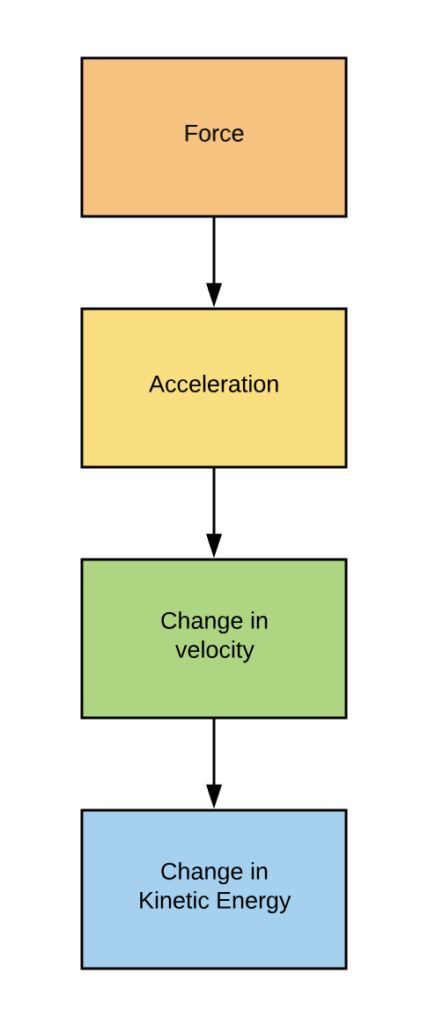
Study Tip 3: Understand the application of equations
Physics equations can be confusing, meaning it can be hard to understand the application of each equation. This means that marks which can be easily scored in quantitative questions can be lost. I combatted this by understanding the dot point(s) of the syllabus each equation targeted. I also ensured I understood the conceptual framework surrounding harder equations, such as those of special relativity. This guaranteed that the only quantitative questions I got wrong were either those that were extremely difficult or on areas of the syllabus I was not confident in.
I did this by including the equations in my notes, even if they were on the formula sheet. I also included any relevant explanations of both the equation and the content it was developed to describe. This allowed me to pair an equation with its relevant dot point, ensuring I understood the applications of all syllabus equations.
An image of this process for Coulomb’s Law is down below

6. My advice to future Year 11 and 12 Physics students
1. Enjoy the subject!
Enjoying any subject is the key to success. Before I started studying Physics in Year 11, I had heard from older students about how Physics was hard. Many of these older students also told me it would be a mistake to choose it for the HSC. Taking this attitude into Year 11 Physics prevented me from doing the best I could do. However, I took a more positive and open-minded attitude into Year 12 and improved almost exponentially. Enjoying the course content will incentivise you to study harder, and improved results will follow.
2. Harness your time effectively by planning ahead.
I used Year 11 as a test run for the HSC and I would recommend that you do the same. It will help you develop efficient study patterns in Year 12 that will help you maximise your time. For example, I realised in Year 11 that I had to revise Physics for at least 2 hours every week!
The most effective way to do this is to plan and commit to a weekly study timetable. This helps you to work around your compulsory commitments and plan your time to maximise study efficiency. During the HSC my commitments involved athletics training three times a week and tutoring on Wednesday nights until 10 pm!
With extra-curricular activities, planning is key.
Study timetables also help you plan your long-term progression in a subject, which I found useful for harder subjects such as Physics. This ensured I would gain a sound understanding of a subject’s course content by the HSC exam.
While it is hard to stick to a study timetable, I gave myself leeway to ensure I stayed focused throughout the day. For example, I would give myself three hours to complete and mark a maths past paper, even though I knew I could complete this in under two and a half hours. Any remaining time I could use as a break to feel refreshed and focused for the next task. This encouraged me to stick to my study timetable throughout the whole week.
My study timetable for the holiday period before my Trial Exams is displayed below.
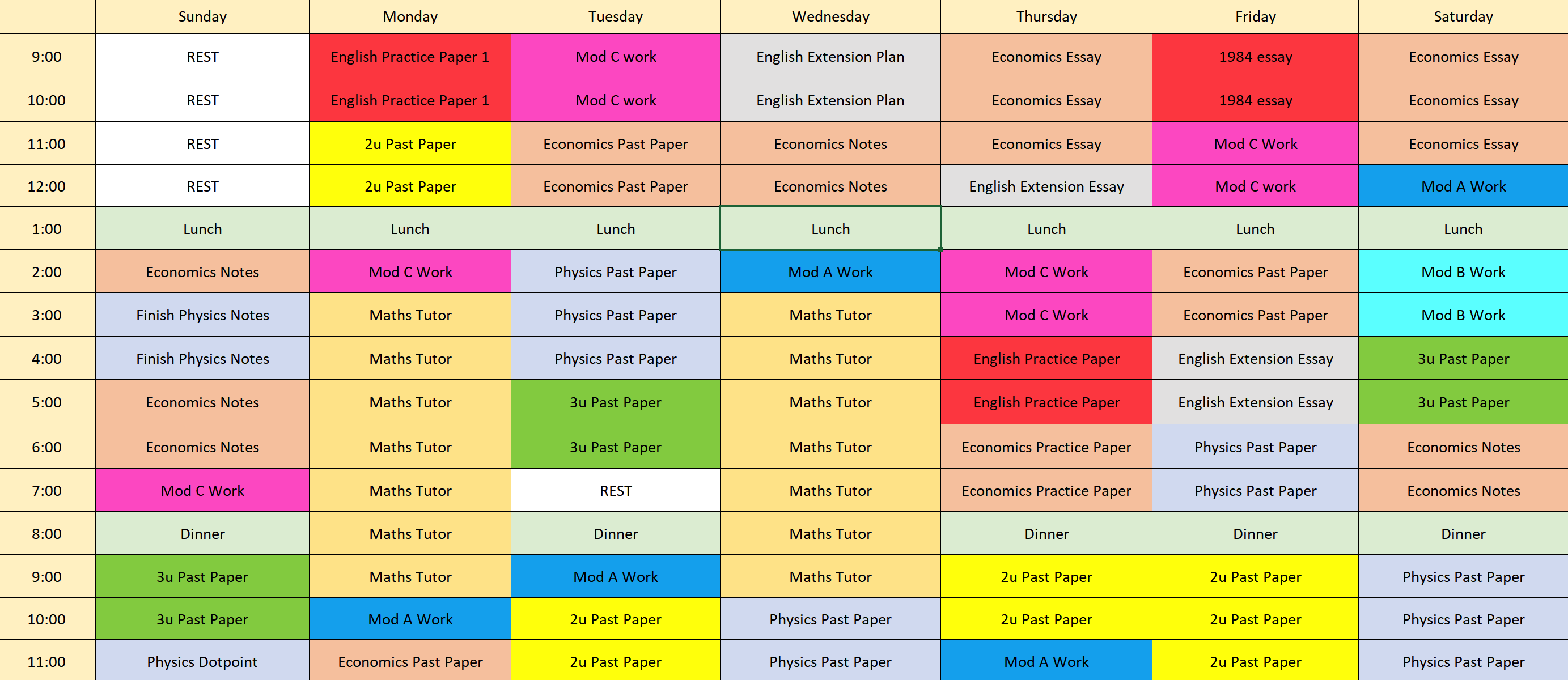
I developed a study timetable with the goal of improving my weaker subjects for my Trial Exams.
One subject I invested a significant amount of time into during this holiday period was English Advanced, with my raw mark below average at 77 and my internal rank 109/210. However, by increasing my English study during the holidays, I was able to attain a raw mark of 85 in my English Trials, improving my overall rank to 46.
However, sticking to my study timetable left me severely exhausted. As I started at 9am and finished at 11-12pm, I would often want to spend some time relaxing after my timetabled day finished. This included watching Season 3 of Stranger Things until 2am. This meant that I got a maximum of 6 hours of sleep during this timeframe. In hindsight, I would recommend taking more frequent breaks during this period to re-energise you for your next tasks.
3. Regular revision is essential.
Additionally, you must constantly revise! While Physics appears to be a mathematically based subject, qualitative and quantitative analysis are equally distributed throughout the course.
Module 7 and Module 8 are theory intensive, and these two modules are taught in the latter half of the year. Time management is key during this period, as forgetting to revise Module 5 and Module 6 during Term 3 and 4 can put you at a significant disadvantage when you have to sit your Trial exams and HSC exams.
Over the past 10 years, the hardest HSC questions have come from the first two modules.
Constantly revising throughout Year 12 was the foundation for my more stable and well-rounded position leading up to my exams. This was the key to helping me maximise my marks. Section 2 (My 4 Step Process) details how I revised for my HSC exam throughout the year.
Learnable Education and www.learnable.education, 2019. Unauthorised use and/or duplications of this material without express and written permission from this site's author and/or owner is strictly prohibited. Excerpts and links may be used, provided that full and clear credit is given to Learnable Education and www.learnable.education with appropriate and specific direction to the original content.